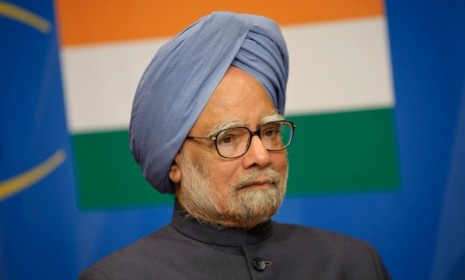Can India's government survive Walmart?
Prime Minister Manmohan Singh has proposed letting the retail giant into the country, but his opponents are threatening to bring down his coalition

A free daily email with the biggest news stories of the day – and the best features from TheWeek.com
You are now subscribed
Your newsletter sign-up was successful
Indian Prime Minister Manmohan Singh was written off in recent months as an underachieving failure for his inability to pass economic reforms that most Western economists say are necessary if India ever wants to be a major economic power. Plagued by corruption scandals and parliamentary infighting, Singh's government has left foreign investors with serious doubts, and the Indian economy is suffering as a result. So it was with some surprise that Singh this week introduced a raft of reforms intended to further liberalize India's economy, including measures to cut wasteful fuel subsidies, privatize state-owned enterprises, and relax restrictions on foreign investment — most controversially, in the retail industry. If passed, Singh's reforms would allow retail behemoths like Walmart to get a firmer foothold in the country, and opponents say smaller mom-and-pop shops will be put out of business. Singh is facing a mutiny from populist members of his coalition, and prominent parties have already dropped out, raising concerns that the government could collapse. Can Singh's government survive Walmart?
Yes. Singh must sell his reforms to the people: Singh "deserves to be complimented for taking hard decisions in the face of considerable opposition," says Chandrahas Choudhury at Bloomberg. And now it's time for Singh to "persuade the Indian electorate that these steps were necessary for the country's long-term health." If Singh can demonstrate a "genuine commitment" to his plans and "prove their intellectual coherence," the Indian voter — "whether farmer, trader, worker, consumer, or investor" — will support his government.
"Now, Singh has to sell Indians on liberalization"
The Week
Escape your echo chamber. Get the facts behind the news, plus analysis from multiple perspectives.

Sign up for The Week's Free Newsletters
From our morning news briefing to a weekly Good News Newsletter, get the best of The Week delivered directly to your inbox.
From our morning news briefing to a weekly Good News Newsletter, get the best of The Week delivered directly to your inbox.
And Singh smartly left it up to states to decide: Singh was "shouted down by populists" the last time he unveiled these reforms in 2011, but this time he has "all but dared them to call his bluff," says Jyoti Thottam at Time. Singh's proposals would allow states to opt out of the retail program, allowing opponents to sit on the sidelines if they want. In a country where Walmart's expertise in basic refrigeration and warehousing is crucial to building up India's non-existent retail infrastructure, smart state officials "will end up competing with one another for" foreign investment.
"How the entry of Walmart and big retail chains will change India"
But it won't be a shock if he retreats: Singh's reform proposals "constitute the boldest liberalization move since" Singh first came to power in 2004, but he "buckled under political pressure when he first announced" the reforms in 2011, says The Wall Street Journal in an editorial. So far Singh "seems unfazed by calls for nationwide protests and other threats," but "given his past performance nobody can be surprised if he backs down again."
A free daily email with the biggest news stories of the day – and the best features from TheWeek.com
-
 Health insurance: Premiums soar as ACA subsidies end
Health insurance: Premiums soar as ACA subsidies endFeature 1.4 million people have dropped coverage
-
 Anthropic: AI triggers the ‘SaaSpocalypse’
Anthropic: AI triggers the ‘SaaSpocalypse’Feature A grim reaper for software services?
-
 NIH director Bhattacharya tapped as acting CDC head
NIH director Bhattacharya tapped as acting CDC headSpeed Read Jay Bhattacharya, a critic of the CDC’s Covid-19 response, will now lead the Centers for Disease Control and Prevention